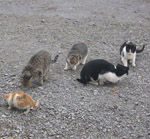Does hunting really benefit the hunted? The case of cougars...
 Mammals,
Mammals,  Protected Areas,
Protected Areas,  Recreation
Recreation  Cougar (aka mountain lion, mountain cat, catamount, panther, etc) A new study in the journal Ecology finds that the hunting of cougars and other large carnivores may not be so good for their long term viability. While this might seem obvious on the surface, it runs contrary to a widely embraced theory that many wildlife agencies use to manage hunting.
Cougar (aka mountain lion, mountain cat, catamount, panther, etc) A new study in the journal Ecology finds that the hunting of cougars and other large carnivores may not be so good for their long term viability. While this might seem obvious on the surface, it runs contrary to a widely embraced theory that many wildlife agencies use to manage hunting.
According to the theory of Compensatory Mortality, hunting can compensate for direct lethal impacts by reducing competition for resources and spurring population growth. The net result may be neutral or even positive for the viability of the species.
In the western United States, cougars are often managed based on this theory. Wildlife managers interested in providing trophy hunting opportunites adopt strategies to reduce male density under the assumption that this will favor female population growth and reproduction. While past studies have found support for Compensatory Mortality in grazing animals, this new study finds that the theory breaks down when it comes to carnivores such as cougars (Puma concolor).
Testing the theory of Compensatory Mortality in cougars...
The theory predicts that hunting will improve cougar population growth through the following impacts:
- Decreased male densities
- Increased maternity rates,
- Increased survival of young,
- Decreased natural mortality, and
- Increased female population growth
To see if this model holds up for cougars, the researchers conducted surveys in two areas in northern Washington - one in which cougars are subject to high hunting pressure and another in which the hunting pressure is low.
The study found that contrary to the model, female popultion density declined in the area subject to high hunting pressure and there was no difference in maternity rates or natural mortality among cougars in the low and high hunting areas. Most interesting the researchers found that survival of young was lower in areas subject to greater hunting.
So what's the reason for these unexpected results?
The researchers hypothesize that the difference in results for herbivores and carnivores like cougars stems from differences in behavior. In the case of herbivores that graze in groups, killing several males increases resource availability for females. However, male cougars will emigrate long distances into new packs taking the place of males lost to hunting. This may explain the increased feline mortality in the high hunting area. According to the researchers,
"Harvesting adult males may increase incidences of infanticide by allowing immigration of new, unrelated males. Lower kitten survival in the heavily hunted area may be a result of high male turnover from hunting. Male carnivores are known to kill unrelated young in order to induce estrous and gain breeding opportunities."
The researchers conclude that the compensatory mortality hypothesis may not be appropriate for modeling hunter harvest for cougars and other large carnivores that exhibit long-distance dispersal.
--Reviewed by Rob Goldstein
Cooley, H., Wielgus, R., Koehler, G., Robinson, H., & Maletzke, B. (2009). Does hunting regulate cougar populations? A test of the compensatory mortality hypothesis Ecology, 90 (10), 2913-2921 DOI: 10.1890/08-1805.1




Reader Comments